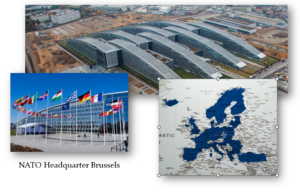Ukraine’s Crisis: The Economic and Geopolitical Stakes

The world is witnessing a pivotal moment as NATO heightens its alert level, placing fighter jets in a state of heightened readiness in response to Russia’s aggressive actions in Western Ukraine. Notably, the Armed Forces Operational Command has confirmed that allied air forces are actively patrolling Polish airspace near the Ukrainian border. This development raises critical questions regarding the future of security and stability in Europe.
The Role of NATO and Leadership Dynamics
Ukrainian President Volodymyr Zelensky’s refusal to entertain any peace deal signals a complex interplay of alliances. Sources indicate Zelensky is closely aligned with NATO and American neoconservative interests, strategically positioned in Western capitals like Paris and London. This is underscored by calls from former President Donald Trump, suggesting that Zelensky’s approach only prolongs the conflict in Ukraine, likening it to a "killing field."
The intricate relationship between Ukraine and NATO cannot be overlooked. While many see NATO as a stabilizing force, some critics argue that it may be contributing to the escalation of hostilities rather than fostering a conducive environment for peace.
Understanding Crimea’s Demographics
As the situation unfolds, it is essential to dissect the demographics of Crimea, a focal point of tension. With a population of approximately 2 million, the majority are ethnic Russians, while 12-15% identify as Crimean Tatars, whose roots trace back to the Mongol invasion of the 13th century. Importantly, the ethnic Ukrainian population in Crimea is virtually non-existent.
This demographic reality complicates the narrative surrounding territorial claims and fuels the argument that this conflict is less about national sovereignty and more about territorial control. Historical context reveals a pattern of ethnic tension and territorial disputes that have persisted for centuries. A deeper understanding of these dynamics is crucial for any analysis of the ongoing conflict.
Historical Lessons from Rome and Carthage
Reflecting on historical precedents, one can’t help but draw parallels between the current conflict and the outcomes of the Third Punic War (149-146 BCE). Rome’s destruction of Carthage was driven by a combination of strategic paranoia, fear of resurgence, and a desire for domination. Just as the Romans justified their actions, contemporary narratives suggest a similar calculus—where the annihilation of a perceived threat becomes a calculated measure for prospective peace.
If we consider the notion of fear intertwined with strategic military action, we may glean insights into how world leaders historically justify war. The pattern often involves total destruction as a means to prevent future conflict.
The Path Forward: A Cautionary Tale
Critics argue that for lasting peace, messages must be heard loud and clear. Some radical perspectives suggest that the only way to end the current war—echoing a Roman mindset—would be a decisive and overwhelming display of military force. Yet, this strategy raises moral and ethical concerns, especially in light of the devastating human costs associated with warfare.
There is a growing concern that if the situation continues without resolution, broader regional implications could arise, drawing in various European nations. A recent vote in the French Senate, which favored increasing military engagement with Russia, underscores the delicate balance of power in Europe. The question remains: will European leaders rethink their strategies before risking escalation to a catastrophic level?
Rethinking Historical Narratives
As we dissect current events, it’s imperative to engage with the historical narratives shaping perceptions today, particularly around sensitive topics like ethnic cleansing or the association between communism and Jewish identities. Understanding these complex narratives is essential for moving toward a more nuanced discourse.
At Extreme Investor Network, we believe in fostering a comprehensive understanding of geopolitical events, going beyond the surface narratives to explore the underlying economic factors, historical contexts, and future implications. Our analysis aims to equip readers with the knowledge necessary to navigate these turbulent waters.
In these times of uncertainty, the stakes couldn’t be higher. The call for strategic analysis, empathy, and informed discourse has never been more urgent. Join us as we unravel these complex dynamics and strive for a pathway toward peace and stability in our global community.

